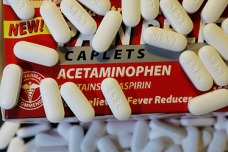ACETAMINOPHEN

GENERIC NAME: Acetaminophen
BRAND NAMES:
Suppositories: Abenol, Acephen
Oral: Tapanol, Tempra, Tylenol, Aceta, Apacet, Atasol, Genapap, Genebs, Liquiprin, Panadol
DRUG CLASS: Antipyretic, Non-Opioid Analgesic
Pregnancy Category B
THERAPEUTIC ACTIONS:
Antipyretic: This drug reduces fever by acting directly on the hypothalamic heat-regulating center to cause vasodilation and sweating, which helps dissipate heat. Analgesic: Site and mechanism of action unclear.
INDICATIONS:
1. Analgesic-antipyretic in patients with aspirin allergy, hemostatic disturbances, bleeding diatheses, upper GI disease, gouty arthritis
2.Arthritis and rheumatic disorders involving musculoskeletal pain (but lacks clinically significant antirheumatic and anti-inflammatory effects)
3. Common cold, flu, other viral and bacterial infections with pain and fever
CONTRAINDICATIONS AND CAUTIONS:
This drug is contraindicated to patients who are allergic or hypersensitive to acetaminophen. Use this drug cautiously with impaired hepatic function, chronic alcoholism, pregnancy, lactation.
ADVERSE EFFECTS
CNS: Headache
CV: Chest pain, dyspnea, myocardial damage when doses of 5–8 g/day are ingested daily for several weeks or when doses of 4 g/day are ingested for 1 yr
GI: Hepatic toxicity and failure, jaundice
GU: Acute kidney failure, renal tubular necrosis
Hematologic: Methemoglobinemia—cyanosis; hemolytic anemia—hematuria, anuria; neutropenia, leukopenia, pancytopenia, thrombocytopenia, hypoglycemia
Hypersensitivity: Rash, fever
INTERACTIONS
Drug-drug
1. Increased toxicity with long-term, excessive ethanol ingestion
2. Increased hypoprothrombinemic effect of oral anticoagulants
3. Increased risk of hepatotoxicity and possible decreased therapeutic effects with barbiturates, carbamazepine, hydantoins, rifampin, sulfinpyrazone
4.Possible delayed or decreased effectiveness with anticholinergics
5.Possible reduced absorption of acetaminophen with activated charcoal
6.Possible decreased effectiveness of zidovudine
Drug-lab test
1.Interference with Chemstrip G, Dextrostix, Visidex II home blood glucose measurement systems; effects vary
NURSING CONSIDERATIONS
Assessment
History: Allergy to acetaminophen, impaired hepatic function, chronic alcoholism, pregnancy, lactation
Physical: Skin color, lesions; T; liver evaluation; CBC, LFTs, renal function tests
Interventions
1.Do not exceed the recommended dosage.
2.Consult physician if needed for children < 3 yr; if needed for longer than 10 days; if continued fever, severe or recurrent pain occurs (possible serious illness).
3.Avoid using multiple preparations containing acetaminophen. Carefully check all OTC products.
4.Give drug with food if GI upset occurs.
5.Discontinue drug if hypersensitivity reactions occur.
6.Treatment of overdose: Monitor serum levels regularly, N-acetylcysteine should be available as a specific antidote; basic life support measures may be necessary.
Educative
1.Do not exceed recommended dose; do not take for longer than 10 days.
2.Take the drug only for complaints indicated; it is not an anti-inflammatory agent.
3.Avoid the use of other over-the-counter preparations. They may contain acetaminophen, and serious overdosage can occur. If you need an over-the-counter preparation, consult your health care provider.4. Report rash, unusual bleeding or bruising, yellowing of skin or eyes, changes in voiding patterns.
REFERENCES:
Acetaminophen Image. http://img.timeinc.net/time/daily/2006/0611/acetaminophen1110.jpg.
Karch, Amy M. Lippincott Williams & Wilkins. 2007 Nursing Drug Guide.
HOME | A-B | C-D | E-F | G-H | I-J | K-L | M-N | O-P | Q-R | S-T | U-V | W-X | Y-Z | HOME
This is a free website hosted by weebly.
This is created for Student Nurses by blue_identity.
